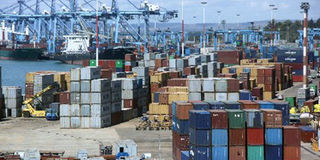Dealers exploiting loopholes in tea export to smuggle contraband goods

Containers at the Mombasa port on March 1, 2016. A Kenya Revenue Authority staff and two businessmen were on October 26, 2016 charged in a Mombasa Court with conspiracy to export used batteries. PHOTO | LABAN WALLOGA | NATION MEDIA GROUP
What you need to know:
- According to entry documents, the 20-foot containers were said to contain 880 bags of Kenyan tea destined for South Korea, with the exporter listed as Kakuzi Limited while the clearing agent was named as Kapwel Enterprises, both from Nairobi.
- KRA regional manager Nicholas Kinoti said the cargo was intercepted after intelligence reports showed that the two containers were loaded with goods different from what was declared in the documents.
Dealers in illegal goods are now exploiting a loophole in the scanning procedures for tea export containers to smuggle contraband goods through the port of Mombasa, it has emerged.
The discovery was made after the Kenya Revenue Authority (KRA) intercepted two containers loaded with at least 2,000 used batteries that were being smuggled out of the country.
According to entry documents, the 20-foot containers were said to contain 880 bags of Kenyan tea destined for South Korea, with the exporter listed as Kakuzi Limited while the clearing agent was named as Kapwel Enterprises, both from Nairobi.
KRA regional manager Nicholas Kinoti said the cargo was intercepted after intelligence reports showed that the two containers were loaded with goods different from what was declared in the documents.
“Scanned images contradicted the declaration on the entry and indicated the probability that they could be loaded with prohibited goods,” he said on Wednesday.
PROHIBITED EXPORTS
“Once investigations are complete the exporter and the clearing agent will be charged with contravention of the provisions of [the] Scrap Metal Act, 2015. The clearing agent also risks being suspended for facilitating the export of prohibited goods,” he added.
Exports of used batteries from Kenya is prohibited, which is why dealers smuggle them to South East Asian countries, where lead is extracted from them.
According to a website marketing used batteries in South Korea, the prices range between $250 (Sh25,000) to $400 (Sh40,000), depending on the model and voltage.
This means that with the 2,000 pieces going at Sh25,000, the value of the consignment is in excess of Sh50 million, making the export of used batteries a lucrative business.
Last week, the KRA impounded two Range Rovers that were being smuggled to Uganda from the United Kingdom.
The sport utility vehicles were concealed in a 40-foot container stuffed with mattresses, with customs officers saying there was a ploy to evade taxes amounting to over Sh16 million.
SCANNING EXEMPTION
The discovery means that dealers in illegal cargo have continued to exploit a loophole in the scanning of tea containers.
The KRA scans all export containers to ensure the contents tally with the declarations on the documents, but exempts tea exports from the process.
The authority entered into an agreement with the East African Tea Trade Association (EATTA) about five years ago in which containers carrying tea are exempted from the process.
Tea is Kenya's largest export, comprising over 20 per cent of total exports, and it was agreed that to fast-track clearance, a customs officer must always be present when tea is being loaded onto containers.
But cartels collude with these officers to stuff illegal goods in the containers.
In April last year, 511 pieces of ivory weighing over three tonnes was found in Bangkok, Thailand, in a container marked as “tea leaves” transported from Mombasa and destined to Laos. The ivory was worth millions of dollars in the black market.
This was the first time illegal goods were discovered being shipped disguised as tea, indicating that smugglers must have taken advantage of the fact that the cargo would not be scanned.





